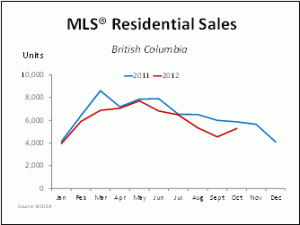This article appeared in the Financial Post on November 9th, 2012 and was written by Andrea Hopkins (Reuters).
TORONTO — Canadian housing prices will fall 10% over the next several years and homebuilding will slow sharply in 2013, but the country’s recent property boom is not expected to end in a U.S.-style collapse, according to a Reuters poll.
The survey of 20 forecasters published on Friday showed the majority believe the Canadian government has done enough to rein in runaway prices, preventing the type of crash that has devastated the U.S. market for years.
“This isn’t a sharp correction, this isn’t a U.S.-style correction, it’s just simply an unwinding of the excess valuation that was created by artificially low interest rates for a long period of time,” said Craig Alexander, chief economist at Toronto-Dominion Bank.
“I would emphasize that while a 10% correction sounds scary, in actual fact, this would be a healthy outcome.”
U.S. house prices crashed as a mortgage crisis unraveled in 2008, triggering a financial crisis and leaving a trail of foreclosures, negative equity and financial hardship for millions of people. Housing prices in the U.S. have only begun to rise again this year.
On a national basis, Canadian house prices are expected to drop 10% over the next several years, and housing starts will fall more than 17% to 184,000 units by mid-2013, according to median results of the poll, which was conducted over the last week.
House prices have already begun to cool in some areas but nationally remain 23% higher than their trough in March 2009, according to a Canadian Real Estate Association index.
Respondents in the Reuters poll said house prices will rise 2.0% in 2012 and fall 0.1% in 2013, according to the median of 18 forecasts, putting most of the losses at least two years away.
Median forecasts had Toronto prices rising 5.1% in 2012 and falling 1.3% in 2013. But respondents saw an eventual 5% fall from current levels. Vancouver prices were forecast to fall 2.7% in 2012 and 3.8% in 2013, with an eventual decline of 12.5%.
As sales decline and prices fall, homebuilders will ratchet back on construction starts, the poll showed.
Related
Canada’s cooling housing market expected to slow economy’s growth in 2013
Are we worrying ourselves into a housing crash?
Everything you need to know about Canada’s housing ‘bubble’
Housing starts, which notched a seasonally-adjusted annual rate of 222,945 units in the third quarter, will decline to 200,500 in the fourth quarter, 186,900 in the first quarter of 2013, and 184,000 in the second quarter of next year.
BITE OUT OF GROWTH
That 17.5% drop in new homebuilding will take a bite out of Canada’s economic growth, fuelled by the housing sector, consumer spending and government stimulus since growth slowed in 2009. But a strengthening global economy should help pick up the slack, Alexander said.
Not everyone is as sanguine. While economists at Canada’s major banks have consistently predicted a softening in prices and a slowing in housing starts, some independent analysts see a very hard landing ahead.
“The housing market is something to be very worried about,” said David Madani, Canada economist at consultancy Capital Economics in Toronto.
Madani, whose forecasts are included in the Reuters poll, has consistently predicted a 25% drop in prices and a plunge in housing starts to just 150,000 next year as builders grapple with too many homes and falling demand.
“The one symptom that housing bubbles always have in common is the over building, and I feel the banks play this down a bit,” said Madani, pointing to recent housing starts well above the 175,000 to 185,000 pace economists say is needed to keep up with population growth.
“We’ve been building above 200,0000 for several years. And we know we’ve been building above demographic requirements because the evidence is in the inventory data – it’s high, it’s not low,” said Madani.
“The excesses are there, it’s plain and clear to see.”
Still, all 15 respondents who answered an additional question said they believe the Canadian government has done enough to slow the housing market and prevent a U.S.-style crash, as Finance Minister Jim Flaherty has argued.
RULE CHANGES HURT
Mindful of the U.S. boom and bust, the federal government tightened mortgage lending rules four times in the last four years to make it harder for home buyers to take on too much debt in their quest for a home.
The rule changes gradually shorted the maximum mortgage length from 40 years to 25 and also put limits on how much homeowners could borrow against their house, among other measures.
While interest rates are not expected to rise until mid-2013, the stiffer lending rules and government warnings about the high debt loads of Canadian households have helped cool the ardor of home buyers, with the hottest markets, including Vancouver and Toronto, already feeling a chill.
Sales of existing homes were down 15.1% in September from a year earlier, and were 6.5% lower in the third quarter from the previous three months, according to data from the Canadian Real Estate Association.
Prices, which lag sales, have started to come down as well. Prices for existing homes dipped 0.4% in September from August, according the Teranet-National Bank Composite House Price Index, but remain 3.6% higher than a year earlier.
Prices of new homes rose 0.2% in the month, the 18th straight monthly gain, and were up 2.4% on the year, according to Statistics Canada.

